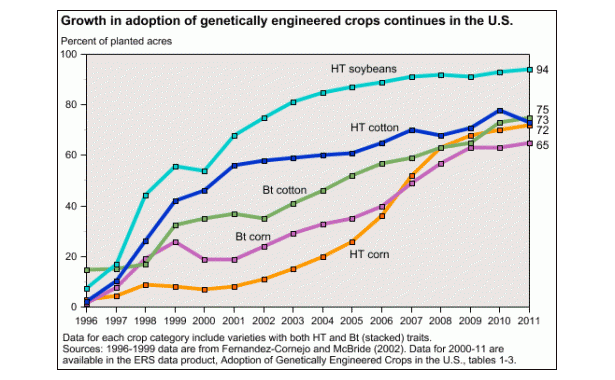An iconographic and text archive related to communication, technology and art.
This week in the link roundup: a tool to export all of your data associated with Google multiple products, a tool to produce recursive drawings, a U.S. judge says that IP doesn’t really provide for accurate geolocation data, Facebook IPO has seen from the perspective of someone who studied the Dot-com bubble, psychopathy in children, a nice introduction to conceptual artist John Baldessari, and finally “superweeds” which are the result of plant adaption to popular herbicide.
• • •
- Google’s Data Liberation Front: Google Takeout.
Google Takeout is a Data Liberation platform that makes escaping from Google products as easy as possible. Takeout lets you take your data out of multiple Google products in one fell swoop. Moreover, you’ll find that all your data is in portable and open formats‚ so it’s easy to import to other services quickly.

- Recursive drawing by Toby Schachman:
Recursive Drawing is an exploration of user interface ideas towards the development of a spatially-oriented programming environment.
“Recursive Drawing” was developped by Toby Schachman for his ITP thesis project “Alternative Programming Interfaces for Alternative Programmers”. See a presentation of his project on Vimeo.
- TorrentFreak: “IP-Address Can’t Even Identify a State, BitTorrent Judge Rules” May 15, 2012. Interesting implications regarding geolocation through IP addresses. Excerpt:
The mass-BitTorrent lawsuits that are sweeping the United States are in a heap of trouble. After a Florida judge ruled that an IP-address is not a person, a Californian colleague has gone even further in protecting the First Amendment rights of BitTorrent users. The judge in question points out that geolocation tools are far from accurate and that it’s therefore uncertain that his court has jurisdiction over cases involving alleged BitTorrent pirates. As a result, 15 of these mass-BitTorrent lawsuits were dismissed.
- The New Yorker’s blog: “Facebook: The Ultimate Dot-Com” by John Cassidy, May 16, 2012. John Cassidy is a British-American journalist and a staff writer for The New Yorker. He’s the author of Dot.con : the greatest story ever sold (2002) and How markets fail : the logic of economic calamities (2009). Excerpt from his article about Facebook IPO:
In Silicon Valley, many people view Facebook’s Web site, and its trove of user data, as the next key technology platform, something akin to Microsoft Windows and Apple iOS, which the company will leverage to create its own economic ecosystem—one that generates huge monopoly rents. Perhaps this will happen. For now, though, Facebook is basically an online media company, and there are some legitimate questions about its prospects. In purchasing its stock, as with buying the original dot-com stocks, investors will be laying out their cash primarily on the basis of hope and optimism rather than a clearly defined and firmly established business plan.
To me, at least, that has echoes of the past. - The New York Times: “Can You Call a 9-Year-Old a Psychopath?” by Jennifer Kahn, May 11, 2012. Excerpt:
She recalled one argument, over a homework assignment, when Michael shrieked and wept as she tried to reason with him. “I said: ‘Michael, remember the brainstorming we did yesterday? All you have to do is take your thoughts from that and turn them into sentences, and you’re done!’ He’s still screaming bloody murder, so I say, ‘Michael, I thought we brainstormed so we could avoid all this drama today.’ He stopped dead, in the middle of the screaming, turned to me and said in this flat, adult voice, ‘Well, you didn’t think that through very clearly then, did you?’ ”
Psychopathy is not only a social problem, but also an epistemological one: we encounter many difficulties in our effort to stabilize knowledge about this phenomenon (even the diagnostic is still controversial). As a complement reading, I suggest this excellent article by John Seabrook: “Suffering Souls: The search for the roots of psychopathy” (The New Yorker, November 10, 2008). More recently see also the debunking of the myth which says that 10% of finance workers are psychopaths: “How Crazy Is Wall Street, New York Times?” by Edward Jay Epstein, May 17, 2012.
- YouTube: “A Brief History of John Baldessari” directed by Henry Joost and Ariel Schulman, edited by Max Joseph, writtn by Gabriel Mussbaum, cinematography by Magdalena Gorka and Henry Joost, produced by Mandy Yaeger and Erin Wright. Uploaded on May 15, 2012:
The epic life of a world-class artist, jammed into six minutes. Narrated by Tom Waits. Commissioned by LACMA for their first annual “Art + Film Gala” honoring John Baldessari and Clint Eastwood.
- The Atlantic: “Superweeds: A Long-Predicted Problem for GM Crops Has Arrived” by Marion Nestle, May 15, 2012. Excerpt:
After a decade of intensive genetically modified plant cultivation, weeds have emerged that are resistant to the most popular herbicide.
This is an excellent illustration of the ambiguity of the technological gift (or the “promethean gift”). It’s also a good illustration of unwanted effects associated with an innovation (innovation should not be thought of exclusively as something positive). On the subject see Diffusion of Innovations (5th edition) by Everett Rogers (Simon and Schuster, 2003) and “Donner la technique” by Roberto Esposito (in Revue du MAUSS semestrielle, no. 6, 2nd semestre, 1995, p. 190).
- By Philippe Theophanidis
- on
- ― Published in Link-roundup




